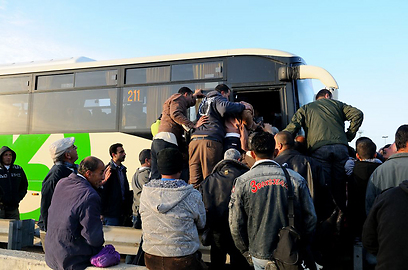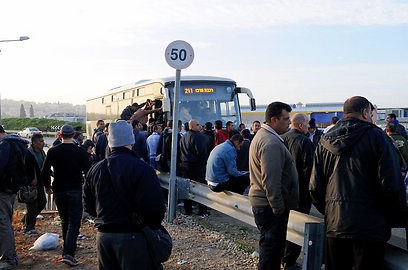
Separate but equal bus lines?
Palestinian workers travelling between West Bank, Israel to use separate public transportation after settlers complain of potential security risks. Leftists call these 'apartheid lines', Transportation Minister Katz says 'Palestinians entering Israel will be able to ride on all public transportation lines'
Tension, delays and chaos ensue on the first day segregated, Palestinian-Israeli bus lines are operated in the West Bank.
On Monday morning, a riot broke out at the exit point of the Eyal crossing, adjacent to Qalqilya after numerous Palestinian laborers could not get to work within the Green Line. They protested the fact that as of now, they must arrive at the crossing from far-off places in the West Bank since the new bus lines are their only means of entering central Israel.
Related Stories:
In response, Transportation Minister Yisrael Katz said that "Palestinians entering Israel will be able to ride on all public transportation lines, including all those already existing in the West Bank."
In addition, according to a Transport Ministry announcement, Katz instructed that all new Afikim bus company lines will be reinforced immediately according to demand. "In light of the great overflow on the few lines operated this morning, the ministry will asses the possibility that lines will leave from additional West Bank points, making it easier for the travelers."

Monday morning at the Eyal crossing (Photo: EPA)
Israel launched two Palestinians-only bus lines in the West Bank on Monday, a step an Israeli rights group described as racist and which the Transport Ministry called an improvement in service.
The ministry opened the lines, to be used by Palestinian laborers travelling between the West Bank and Israel, after settlers complained that Palestinians on mixed buses were a security risk.
The separate Palestinian bus line initiative aroused a wave of reactions from both sides of the Israeli political spectrum. Leftists called upon the Transport Ministry to cancel what they call "Apartheid lines."
Meretz Chairwoman Zahava Gal-On turned to Katz and demanded that he "immediately cancel the segregated lines in the West Bank. Separate bus lines for Palestinians prove that occupation and democracy cannot coexist," she said.
According to Gal On, the decision to separate between Jews and Arabs stems from settler pressure and not from the desire to improve upon services for the Palestinians. "Separation on buses based on ethnicity was customary in the past in racist regimes around the world and is unacceptable in a democratic country."
Peace Now activists also protested the operation of these lines and said, "the decision to (operate) separate bus lines in the territories is shocking and turns racism into the norm. A Palestinian Rosa Parks is needed to insist upon sitting on Jewish bus lines, (someone) who won't surrender to discrimination."
Conversely, Karnei Shomron Regional Council Chairman Herzl Ben-Ari, one of the leading pressure-putters on the Transport Ministry for finding a solution to the overload and the tension on the regular West Bank bus lines commented as well.
Ben-Ari said that "the situation in the past few months in which Israeli citizens have been compelled to ride on bullet-proof buses under IDF instruction and find buses full of people from the Arab population, is absurd, not to mention the security risk involved. On the other hand, the Arab population is compelled to pay a fortune for unlicensed drivers to pick them up straight from the crossing. The current solution is good for all. It allows Arabs to ride cheaper and regulated buses."
"Creating separate bus lines for Israeli Jews and Palestinians is a revolting plan," Jessica Montell, director of the B'Tselem rights group, said on Army Radio. "This is simply racism. Such a plan cannot be justified with claims of security needs or overcrowding."

Overload on Palestinians-only buses (Photo: Gur Dotan)
Ibrahim, from the West Bank village of Bidya said, "it is impossible for to make it all the way here. I need to leave an hour and a half earlier because I live far from the Eyal crossing, and if I miss the bus – my whole workday is gone."
Fauzi, who lives in the village of Zaita, adjacent to the West Bank city of Ariel, requested to arrive to work in Israel and was also delayed at the Eyal crossing. He expressed his frustration regarding the situation and said "this chaos is unclear to me. I need to drive an hour and a half just to get to the bus, and now it is not clear if there are even enough buses."

No room on buses (Photo: Gur Dotan)
Additional laborers who arrived at the crossing, verbally confronted Transport Ministry and Afikim bus company representatives, who were guarded by police officers who arrived at the scene to maintain order.
"The Ministry of Transport has not issued any instruction or prohibition that prevents Palestinian workers from travelling on public transport in Israel nor in Judea and Samaria," it said, referring to the West Bank.
"Furthermore, the Ministry of Transport is not authorized to prevent any passenger from using public transport services."
Rights groups, however, voiced concern that Israeli police at checkpoints in the West Bank would remove Palestinian passengers from regular bus lines and order them to use the new ones.
Police spokesman Micky Rosenfeld said all Palestinians returning to the West Bank would be searched for stolen property, describing this as a routine Israeli precaution.
He said he did not know whether and how this might affect Palestinian travel on regular buses.
- Receive Ynetnews updates directly to your desktop










